
For most people, getting started with jiu-jitsu might seem like the hardest step. And while it’s true that entering a gym for the first time can feel intimidating (until you realize how friendly most jiu-jitsu practitioners are), the truth is that the difficulties getting started often pale in comparison to the difficulties continuing training for the long haul.
Jiu-Jitsu’s attrition rate has been well documented. One of the reasons jiu-jitsu is such an effective martial art lies in its complexity, which takes even the most talented practitioners years to really get their heads around.
That said, there are plenty of things both beginning and advanced students can do to get the most from their jiu-jitsu training and avoid landing on the wrong side of the statistics.
Here are 3 tips to get the most from your jiu-jitsu training in the long term.

Consistency is key
Nearly every instructor has stories of students who, upon taking their first class, develop a rabid enthusiasm for the gentle art. For a week, or a month, or even a year, such students live on the mats, catching every class, obsessing over every delicate detail of each technique.
But sooner or later, life happens. People get sick. Injuries crop up. Schedules change, degrees are pursued, and sooner or later training goes by the wayside. It might start with a week off the mats. Then a month.
Gradually, the student falls off of training altogether, until the biggest thing keeping them from coming back is the fear that returning to the mats will be frustrating due to lost time and stamina.
And they’re not wrong in many ways. Jiu-jitsu is a perishable skill. It relies on timing, experience, and fitness for success. Extended time off the mats kills all three.
One of the keys to getting the most from your jiu-jitsu training is minimizing these breaks. In fact, one of the greatest pieces of advice one can give to a beginning practitioner is this: It’s better to train twice a week for ten years than ten times a week for two.
It takes time to improve. Much of that time happens off the mats after training by turning the day’s techniques over in your mind until they click. By making your training a priority and not allowing yourself extended breaks, you can ensure that jiu-jitsu stays fresh on your mind while gaining the experience to develop a sense of timing.
Even if you’re injured, attend class and take notes. It will keep you feeling connected through the wait.

Focus on learning in training, not on winning
This is a huge one. There’s a saying in jiu-jitsu: you either win, or you learn. Much of the learning happens through losing in sparring and in competition. One of the worst habits students develop, usually around the blue belt, is only focusing on the techniques they’ve become proficient at.
This is a recipe for stagnation.
Instead, treat the gym like a laboratory, and use your mat time to develop new skills. Try to use the technique taught in class during sparring at the end, and always prioritize learning over winning.
Sure, being bad at those new skills means inevitably you will fail and get submitted. But in that process, you will both perfect the technique and develop your defense. In the long run, you’ll pass up the students who keep focusing on the same techniques they’ve already got a grasp on in order to avoid losing.
Take responsibility for your training
This one’s all about mindset. MANY students fall into the trap of thinking that showing up is enough. After all, you paid your dues, and you came to class, right?
Wrong.
The problem with this approach is it assumes you come to class and have jiu-jitsu given to you. It might work, eventually, but such development will be slow because it is passive.
A small shift in mindset will produce tremendous results. Come to class planning to take technique. Think of your instructor as a guide, showing you the right path to walk, and understand that you must do the walking.
Rather than coming in to absorb technique, come to engage with it. Pull it apart with your mind, try to discover the inherent leverage and concepts that run through each technique. Try to get the why, not just the how.
By approaching your training this way you’ll see bigger results faster. You’ll also develop a much deeper understanding of jiu-jitsu, which will serve you well in the advanced belts and beyond the mats in everyday life.
Jiu-jitsu’s techniques are endless. By learning the concepts that make them function, and by taking an active learning mindset, you’ll see far better results.

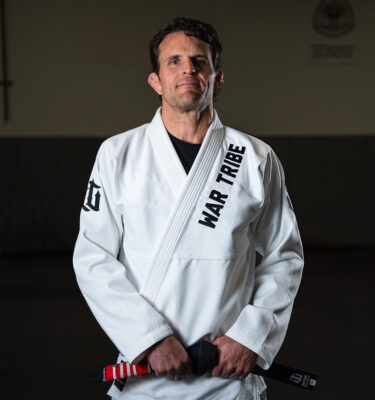
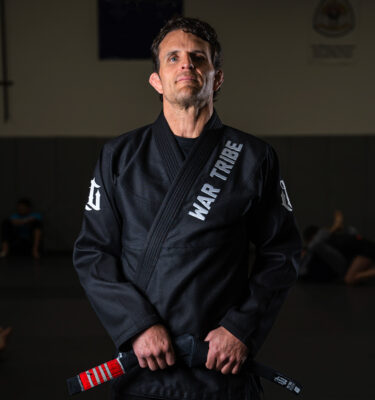
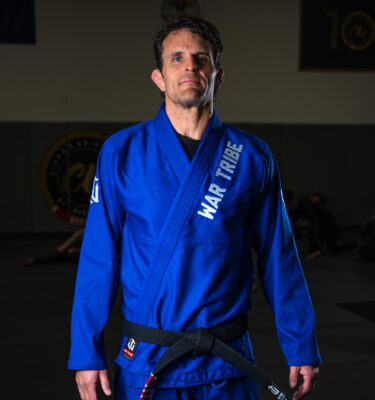
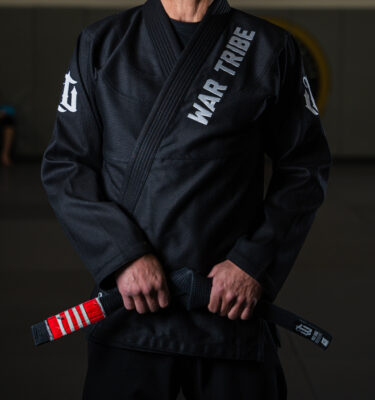
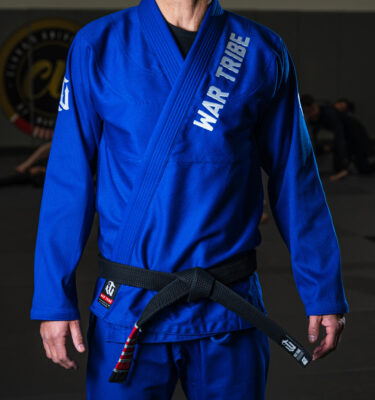

Are there war tribe professors in nh?
Do you sell men’s white Gi pants?
To avoid any return. What size would you recommend. I’m lean 6’2 with long arms and legs, around 190- 195. I love your artwork on your gi s . Shopping around the $100-150 range